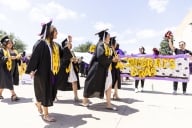You have /5 articles left.
Sign up for a free account or log in.
In Spring 2014, 30 medical students at Giessen Medical School in Germany finished the first edition of the HarvardX massive open online course (MOOC) “Global Health: Case Studies from a Biosocial Perspective” (SW25x), and proudly received two certificates: one issued by HarvardX for independent completion of the MOOC and a second acknowledging this course within the regular Global Health curriculum of their home university.
Initiated as a pilot attempt for identifying the usefulness of blending MOOC and classroom teaching, this first experience shows the practicability and the huge potential – and we would even say: need – for combining globally available MOOCs with locally grounded classroom teaching, giving ample space for discussions lead by qualified academic staff. Any attempt, in contrast, to replace local teaching by MOOC appear misguided and misinterpreting the educational value of these means.
In addition to the MOOC, which students took independently, the students had to participate in two compulsory classroom-meetings organized at Giessen University in the final stage of the online course to discuss selected content. After finishing the course, they were asked to submit a feedback on their individual learning experience. Minutes of the classroom discussions and the statements collected by the online survey eventually allowed for a detailed assessment of the learning outcome and of students’ perceptions of the quality, practicability and educational impact of the course – including the potential value of additional classroom teaching.
The results were overwhelming: Both the particular content and the characteristic bio-social perspective of the course, with its strong commitment to medical anthropology, history and social sciences, and the combination of high quality online content with seminars at the home university, were evaluated extremely positive. “Using social theories to understand global health problems seems to me a very interesting approach”, one student wrote, “and the only possibility to finally succeed”.
The structure, technical realization and online materials were highly appreciated. Regarding the combination of MOOC and classroom seminars, some students even suggested to expand the face-to-face-meetings: "A classroom meeting for reflecting the course is very useful (and should take more time, if manageable). I suggest several meetings in smaller groups throughout the course, which gives opportunity to discuss topics in more detail, and gives motivation to distribute the workload and prevents from working too much in the final phase.”
It is important to note that we do not advocate replacing traditional residential teaching with MOOCs. Rather, MOOCs are another tool, such as books and articles, to integrate the ideas scientific expertise of other scholars from the field into our classroom. Though only two physical meetings had been conveyed, evidence is strong that these not only were crucial for consolidating content, clarifying doubts, and clearing misunderstandings, yet also for adherence: Knowing about upcoming seminars motivated participants to finalize the online units in time. Finally, the live-presence – via web-connection – of HarvardX Senior Fellow, Catalina Laserna, and course lead, April Opoliner, in parts of the seminars also improved students’ motivation and adherence.
One very common argument against using MOOCs in academic training is that online units with internationally renowned scientists supposedly undermine the authority of local faculty. In our experience, just the opposite happened: Our teaching goal and commitment to introduce social theory, history and anthropology into global health education – perspectives that are often perceived as to be of only tangential value within medical sciences – was strongly supported. Moreover, the face-to-face-seminars provided room for critical discussions about the arguments presented by MOOC. Students were encouraged to apply their critical yet constructive perspective even on claims made by distinguished scholars from Harvard, just in the same way they do with faculty at home. This experience was really inspiring and illuminative, and it’s good to see that in later occasions, in seminars on other topics or informal conversations, students come back to the biosocial approach presented in this MOOC and some even ask for more history, anthropology and social theory in their medical training.
Drawing on this experience, our next step will be to organize collaborative MOOC-based teaching projects among partner universities around the globe, with virtual classroom seminars connecting students in different countries and continents. In regard to the particular topic – global health – which by nature deals with the dynamics between globally relevant structures, developments, and topics (like health inequities) on the one hand, and local realities and adaptations on the other, this will be especially useful. When academic excellence, face-to-face teaching and new technologies happen to be combined in this way, we will probably come close to talk about blended learning at its best.
Michael Knipper is University Lecturer for Medical History, Anthropology, and Ethics at the Institute of the History of Medicine in the Faculty of Medicine at Justus Liebig University in Giessen, Germany, and a Visiting Researcher at Harvard Medical School; and Christine Hofstetter is a student assistant in the global health program and fifth year medical student at Justus Liebig University in Giessen, Germany.







